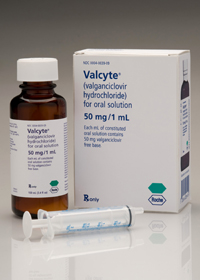Product
Valcyte (valganciclovir hydrochloride)
Approval Date
August 28, 2009
Release Date
January 11, 2010
Company
Roche
Class
Oral antiviral drug
Indication
For the prevention of cytomegalovirus (CMV) disease in pediatric kidney and heart transplant patients (4 months to 16 years of age) at high risk of developing CMV disease. The FDA also approved a new pediatric oral solution formulation for Valcyte, which will allow easier administration to pediatric patients 4 months to 16 years of age.
Active Ingredient
Valganciclovir hydrochloride
Agency Roster
Ferguson
Marketing Strategy/Execution
Children receiving organ transplants are especially vulnerable to infection because of their reduced immunity and the invasive procedure of a transplant can put them at higher risk of contracting CMV infection. Medication dosing can also be challenging for children. The new oral formulation provides an additional option for doctors to treat their pediatric transplant patients.
Physician Outlook
Roche’s antiviral Valcyte, a standard of care in the prevention of CMV (cytomegalovirus), recently received an indication for pediatric kidney and heart transplant patients (ages 4 months to16 years). It is now available as a pediatric oral solution. Valcyte’s expanded indication and easier administration will likely be welcomed by physicians treating vulnerable pediatric transplant patients.
—Mary McBride, Associate Vice President, Research, GfK Healthcare
Also in the Pipeline (courtesy of Adis R&D Insight)
Drug: 1263W94
Manufacturer: GlaxoSmithKline/ ViroPharma
Indication: Cytomegalovirus infections
Active ingredient: Maribavir
Phase: III
Source: Wolters Kluwer Pharma Solutions
Adverse Reactions
GI upset, fever, bone marrow depression, headache, insomnia, retinal detachment, peripheral neuropathy, paresthesia, aplastic anemia, bleeding, CNS effects, elevated serum creatinine, infections, tremor, hypertension.
Adults
Take with food. ≥16yrs: Treatment: induction: 900mg twice daily for 21 days; maintenance: 900mg once daily. Prevention: 900mg once daily starting within 10 days of transplantation until 100 days post-op. Renal impairment (CrCl <60mL/min): reduce dose; see literature. Hemodialysis (CrCl <10mL/min): not recommended (use ganciclovir).
Children
<4months: not recommended. Take with food. ≥4months: Dose (mg)= 7 x BSA x Creatinine Clearance (see literature). Round calculated dose to the nearest 25mg increment; max 900mg. If calculated dose within 10% of tablet strength, tablets may be used.
Contraindications
Acyclovir or ganciclovir allergy.
Precautions
Do not substitute on a mg-per-mg basis for ganciclovir. Avoid handling broken tabs. Withhold dose if absolute neutrophil count <500 cells/microliter, platelet count <25,000/microliter, or hemoglobin <8 g/dL. Reduce dose or discontinue if blood dyscrasias occur. Renal impairment. Cytopenia or cytopenic reactions to drugs, chemicals, irradiation. Monitor CBCs, platelets, ophthalmic, and renal function. Maintain adequate hydration. Use effective contraception during (men and women) and for at least 90 days after treatment (men). Elderly. Pregnancy (Cat.C: teratogenic, embryotoxic, carcinogenic, aspermatogenesis in animals), nursing mothers: see literature.
Interactions
Zidovudine increases anemia/neutropenia risk. Caution with nephrotoxic drugs (eg, cyclosporine, amphotericin B, mycophenolate). Monitor for toxicity with didanosine. Probenecid increases levels. Caution with drugs that inhibit replication of rapidly-dividing cells (eg, dapsone, pentamidine, antineoplastics). Avoid imipenem-cilastatin (seizures).









